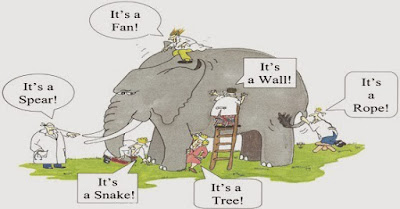Remember
the Indian fable “Six Blind men and The Elephant”?. They began to
argue and shout about the shape of an elephant. Each one of them insisted that
he was right and literally got into a fight. A wise man who was passing by, saw
this. What is the problem? he asked. “We cannot agree to what the elephant looks
like.” Each one of them told what an elephant looks like according to them. The
wise man calmly explained to them. “All of you are right. Elephant is a huge
animal. Each one of you touched a different part of the elephant. Elephant has
the features each one of you said”.
Though the moral of the story is to highlight the limitations of human perception, it is a beautiful example to define/visualize features of an object.
To get the bigger picture you need to have that leap in perception, to connect the dots, lines and planes….
The everyday world is a 3D (three dimension) space. It has width, depth and height. This is the one we live in, the one we are used to from the day we are born. This is what teaching 3D and 2D is about. “Spatial Awareness”.
In this 3D world you can go forward-backwards, right-left, up-down.
The ability to travel up into space and then dive deep down into the water, differentiated 3D from 2D.
Check out the Key Concepts, their importance and Teaching and Learning Points.
Features/Properties of these 3D shapes in Mathematical Vocabulary


As children develop their understanding of dimensions this way, they will be able to represent them in different forms. Through drawings, models, words and gestures. (I recollect with great pride the dance on solid shapes we did for our ‘Math Assembly’ in Coimbatore).
Practical applications of 3D - Product design, Remote Surgery, Lay out of Stores, Molecular Science, Photo Realistic Rendering, Movies and many more. 3D modeling is mathematical representation of a object, explaining how the object is put together. It is equal parts of Math, Geometry and Design.
And for those who like a little more… check out this article.https://plus.maths.org/content/mother-all-theories
Though the moral of the story is to highlight the limitations of human perception, it is a beautiful example to define/visualize features of an object.
To get the bigger picture you need to have that leap in perception, to connect the dots, lines and planes….
The everyday world is a 3D (three dimension) space. It has width, depth and height. This is the one we live in, the one we are used to from the day we are born. This is what teaching 3D and 2D is about. “Spatial Awareness”.
In this 3D world you can go forward-backwards, right-left, up-down.
The ability to travel up into space and then dive deep down into the water, differentiated 3D from 2D.
Progressive approach to teach 3 dimensions to children
https://nzmaths.co.nz/shape-early-learning-progressionCheck out the Key Concepts, their importance and Teaching and Learning Points.
Features/Properties of these 3D shapes in Mathematical Vocabulary

(https://spiritualcollection.files.wordpress.com/ https://www.math-only-math.com/images/)

https://imgv2-1-f.scribdassets.com/img
As children develop their understanding of dimensions this way, they will be able to represent them in different forms. Through drawings, models, words and gestures. (I recollect with great pride the dance on solid shapes we did for our ‘Math Assembly’ in Coimbatore).
Practical applications of 3D - Product design, Remote Surgery, Lay out of Stores, Molecular Science, Photo Realistic Rendering, Movies and many more. 3D modeling is mathematical representation of a object, explaining how the object is put together. It is equal parts of Math, Geometry and Design.
And for those who like a little more… check out this article.https://plus.maths.org/content/mother-all-theories



